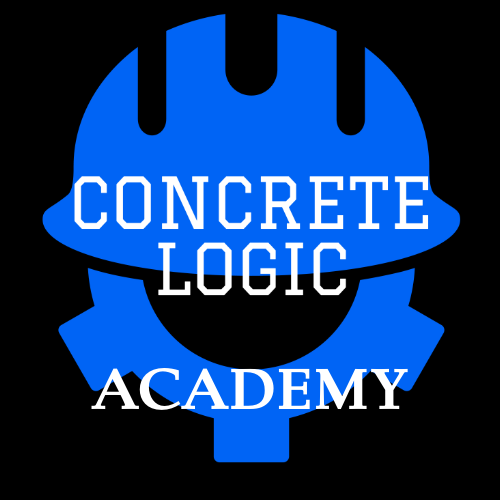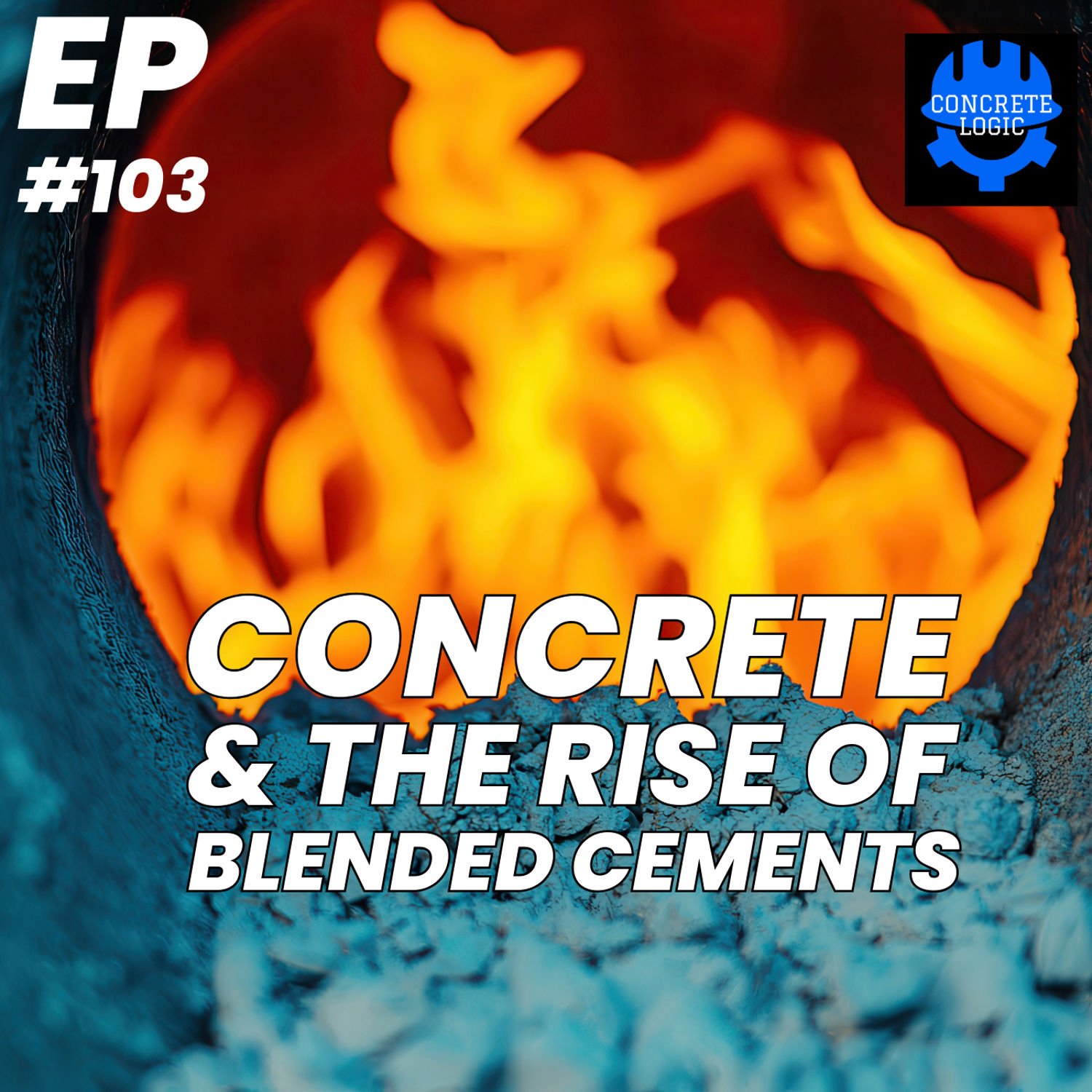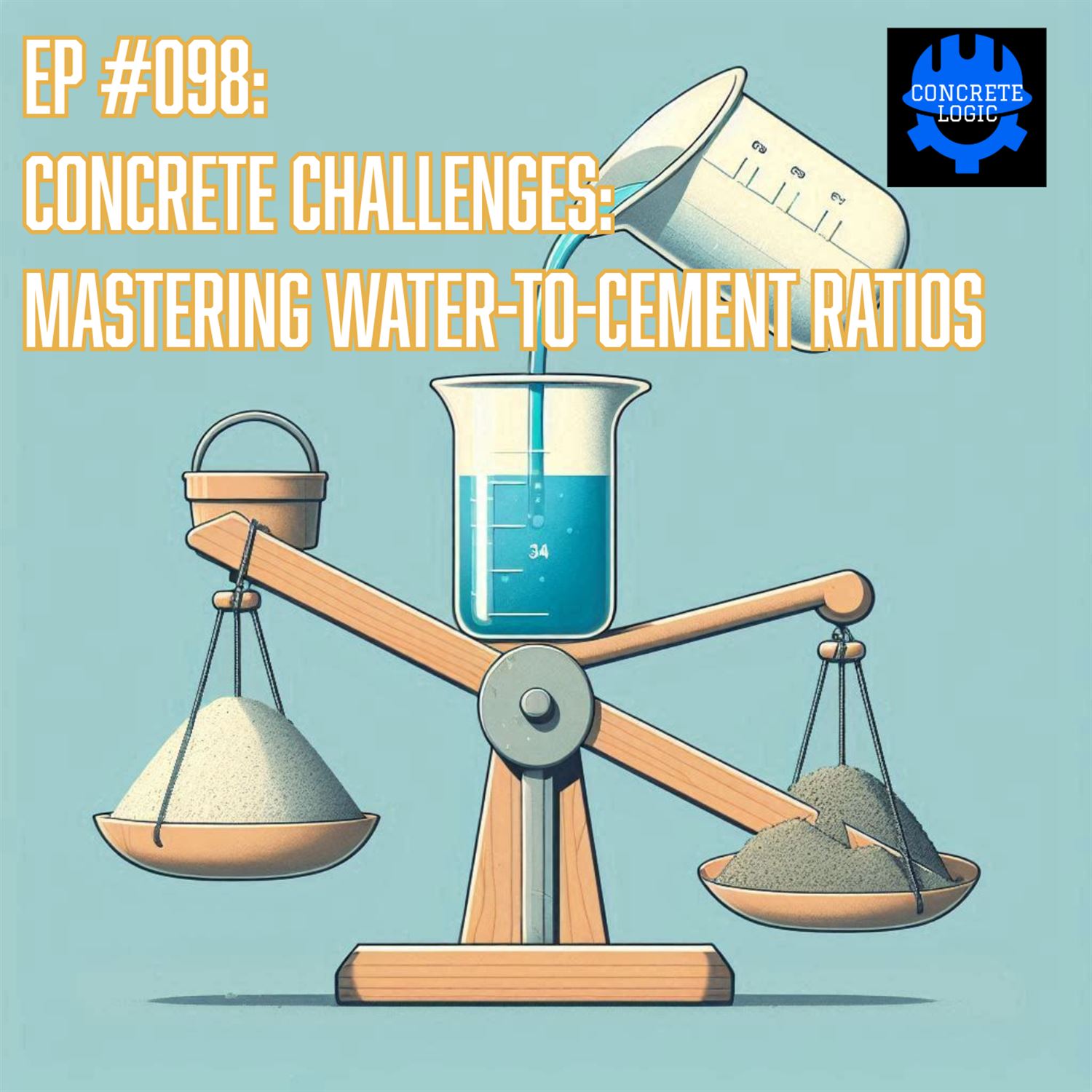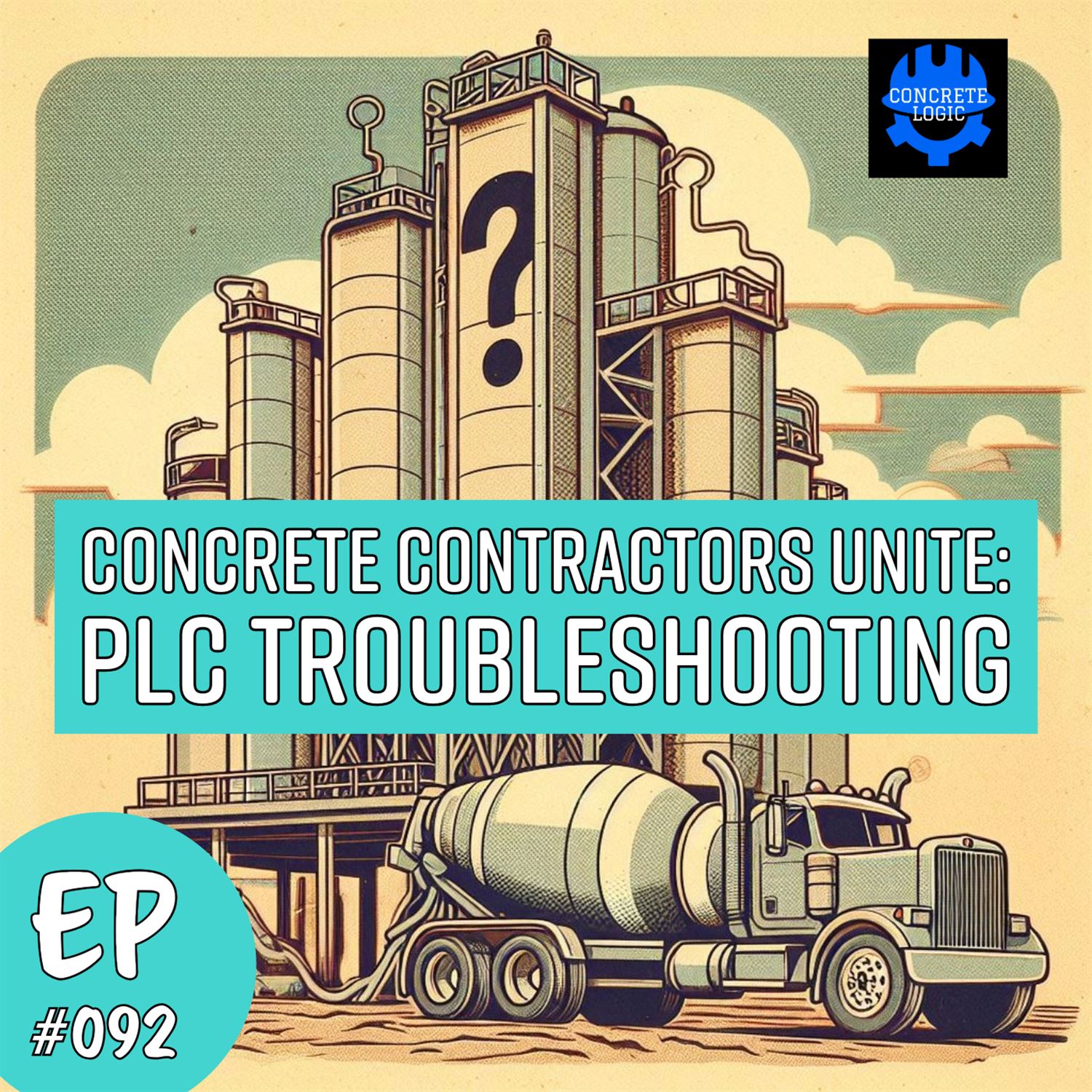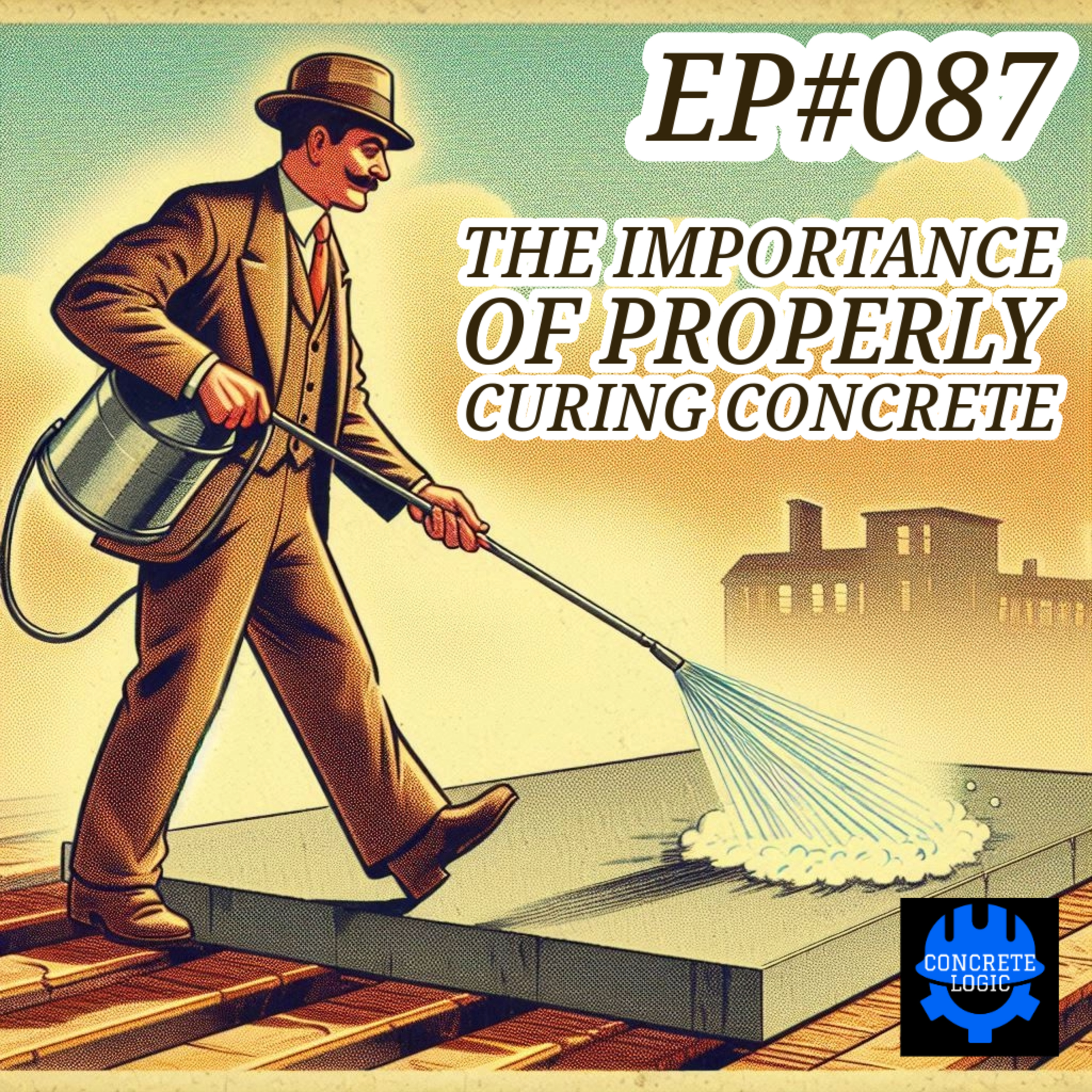
EP #084: The Concrete Path to Stratospheric Success

In this episode of the Concrete Logic Podcast, host Seth Tandett answers questions from students at Virginia Tech about career advice and the inspiration behind the podcast. He discusses the benefits of staying with one company for a long time and finding a good fit in terms of culture and values.
Seth also shares the five laws of stratospheric success from the book 'The Go-Giver' and highlights the variety and unique aspects of the concrete industry. He concludes by inviting listeners to visit the podcast website and support the show.
Takeaways
- Staying with one company for a long time can lead to success and higher earnings in the long run.
- Finding a company that aligns with your values and culture is important for job satisfaction.
- The five laws of stratospheric success from 'The Go-Giver' are: value, compensation, influence, authenticity, and receptivity.
- The concrete industry offers a variety of roles and requires knowledge in chemistry, weather forecasting, and engineering.
- Concrete structures are sustainable and built to last, making the industry rewarding for those involved.
Chapters
00:00 Introduction and Q&A Format
06:41 The Five Laws of Stratospheric Success
14:10 The Variety and Unique Aspects of the Concrete Field
***
Did you learn something from this episode? If so, please consider donating to the show to help us continue to provide high-quality content for the concrete industry.
Donate here: https://www.concretelogicpodcast.com/support/
***
Episode References
Guest: Virginia Tech CEM Students
Guest Website: https://www.vt.edu/academics/majors/construction-engineering-and-management.html
Book suggestion: The Go-Giver https://thegogiver.com/movement/
Producers: Jodi Tandett
Donate & Become a Producer: https://www.concretelogicpodcast.com/support/
Music: Mike Dunton | https://www.mikeduntonmusic.com | mikeduntonmusic@gmail.com | Instagram @Mike_Dunton
Host: Seth Tandett, seth@concretelogicpodcast.com
Host LinkedIn: https://www.linkedin.com/in/seth-tandett/
Website: https://www.concretelogicpodcast.com/
LinkedIn: https://www.linkedin.com/company/concrete-logic-podcast
[00:00:00] Seth: Welcome to a special episode of the concrete
logic podcast. And today our guest is, I don't have a guest, it's just me. I been working with Ashley Johnson, associate professor at the construction engineering and management program at Meyers Lawson school of construction at Virginia Tech reached out to her and asked her to have Her students send me questions that they want answered and they sent me a lot of questions and some of them I can answer myself.
Some of them I'm going to have to bring on some guests to tackle, but today I'm going to, I'm going to tackle some of them. So I'm going to read these questions off to you all and then do my best to answer them. So this question This first question is, do you feel as a hopping between jobs at companies early on in your career is a good idea?
Would it be better to stay at one company for five to ten years or would that greatly reduce your potential for higher earnings down the road? That's a great question. Actually when I was out there the last fall for a career fair at Virginia Tech that was a question that was asked why I was there as well.
In my opinion, and just the being around folks that are. that I work with and in my eyes who is successful. I would say the majority of them have been with the same company for a long time. We're talking, 10, 15, 20. 30, even 30 years. And in my eyes, those folks are successful. So what this question here seems to have success tied to higher earnings and which I totally get when you're young and you're coming out of school you just want to go out there and make some money.
And I was the same way when I finally figured out what I was going to do I know wanted to go out there and make some money and be able to buy things and things like that. But what I will warn you is that's not necessarily the best way to go at it. If I was to do it all again I would definitely, uh, make sure I spent some time figuring out looking for a company that really fits.
My, my beliefs in my culture cause those are the people you're going to be spending most of your time with. We, most of our waking hours we spend working. So it, it'd be good idea to get. In with a company that you enjoy being around, you enjoy the folks that you work with, you enjoy doing the type of work versus just going out there and looking for a job that pays a, a high salary or good salary.
What you're looking for. Funny is when I was young and really young. And I remember I was out at a bar, and I was talking to this bartender and, uh, we were just chatting, and I remember he said something, I don't even remember what we were talking about, but I just remember him telling me one thing and he said he said, the money will come.
And I was like, I always remembered that the money will come. And what he meant by that was, don't get all caught up on, picking a job because they pay you a certain amount or have, maybe benefits or something that you're looking for, you really got to find, a good fit for you.
I think that's more, more important. And once you get in with that company and you work hard. And you put the effort in that will be recognized if you pick the right company and then, like the bartender said, the money will come, as you show your effort and your worth to the company, a good company will take care of you.
And that's been my experience. So that's what I would tell you is. Don't jump job to job. I don't think we I'll tell you right now. I don't think right. We've had, I think the last, I'm recording this in 2024. I'd say, 2020, 21, 22, 20, even 23. You might have had that luxury to jump job to job and you were going to get a job.
But I think those times are, uh, slowly going away here. So I would be caution you on doing that. I would definitely take your time. Make sure you find the right job. If you're still in school, take advantage of internship programs. So that way you can go, uh, Work for a company for a short amount of time and see how they operate and get around the people that work at this company.
And you'll find out if you feel comfortable there that's your time to go out there and explore in. But that's what I suggest doing. But you gotta do what's best for you too. So you gotta keep that in mind, but that's so that's what I suggest that's my answer for that one.
Since we're on the topic of career advice, something just came to me. I wanted to share with you all. I ran across this book a couple of years, I think it's a couple of years now, but it don't matter. But the, this book called the go giver, it's a great great story about Someone that is, starting a career and they're meeting with the individual.
But the point is, there's these 5 laws of stratospheric success. And I have these things on my, I have this, these 5 laws on my phone. And I, I. Look at them at least a couple of times a week to remind me of how to how to be successful in business and in everything. I thought I'd share that with you guys today.
This book is called the go giver. Look it up. I'm sharing it on my screen right now. It's was it I want to give credit to the authors here Bob Berg and John David Mann. You should again, it's called the go giver a little story about a powerful business idea. And then like I said, it's got these 5 laws of stratospheric success.
And it's a great book because it's it's not something that it's. It's not a textbook by any means. It's a story and how these five laws come to play. But I thought I'd share these with you and keep these things in mind as you're if you're just starting off or even if you've been in, in in the business for a while, but anyways, so the first law is called the law of value.
The law of value is your true worth is determined by how much more you give in value than you take in payment. You always want to provide more value obviously, than you get paid. That's it just, uh, should be something you strive for. So you don't want your, if you're working for a company, you don't want them just to you want them to be successful, right?
So whatever value you bring to the company it should be, it, Many times more than what you're worth. And you just got to have that kind of attitude. The law of compensation is the 2nd 1 is your income is determined by how many people you serve and how well you serve them. Essentially, it's saying if, the more people you touched more people, you help the more successful you will be, the more money you'll make.
Like this individual that wrote this question seems they're concerned about, uh, making more money. And it seems like these days the way to do that is to. Jump from job to job and getting an increase from each job to job. But this is telling you to do otherwise, it's hard to create a I think, create a a a network of folks that you can help out and serve if you're jumping from one company to the next.
Not gonna make any. A lot of great relationships and that in that fashion the 3rd 1, the law of influence your influence is determined by how abundantly you place other people's interest 1st. Don't be selfish, put other people's interest in 1st.
I think that's pretty self explanatory, but that's a good one. Again, the Law of Influence. Your influence is determined by how abundantly you place other people's interests first. The fourth one, the Law of Authenticity. The most valuable gift you have to offer is yourself. So you want to be authentic at all times.
Don't act don't act like. Something you're not that's something I'm sure a lot of people struggle with. And then the last 1, the 5th law is the law of receptive receptivity. So the key to effective giving is to stay open to receiving that 1 I struggle with myself, uh, being acceptive of folks that are trying to help you out, is the best way to describe that 1.
but anyways, I just wanted to share those 5 laws of stratospheric success again. That book is called the go giver. I highly recommend you pick that book up. It's an easy read. It's not very long. Um, yeah, give it a read. Give it a give it a read and yeah, if you you listening on on YouTube or whatever, you could comment below and tell me what you think.
Next question I got for the Virginia Tech students question is pretty straight forward here. What inspired you to start this podcast? Over, I would say Within the last 3 to 4 years, I've been doing the podcast for 2 years now, but over the last 3 to 4 years, I wanted to do a podcast.
And I wanted it to be construction related, but what really inspired me to start concrete logic was really wanted to be a positive voice for the concrete industry. There's a lot of would say misunderstandings of concrete there's, the whole carbon footprint narrative out there and concrete.
Appeared to me was in the bad guy of the building materials out there. And I just wanted to be a resource for folks. So they had an educational Channel that they could turn to, to learn more about concrete. And that's what we strive to do at the concrete logic podcast is to educate you about what's going on in the concrete industry.
And not necessarily, um, I would say it's not necessarily a good idea to get your concrete knowledge from folks that are in the concrete industry. Um, of course we're going to speak. Positively of our, of our industry, because we're there, everyone that I know that's in concrete, and it's been in concrete for a little while is very passionate about the industry.
And I'm trying to do my best to give you all the listeners a balanced, on about concrete. For instance mentioned the CO2 footprint and why the, why concrete has such a large footprint CO2 wise is because it's the most used man-made material on earth.
So it's based on volume. So if anything else was used, any other material that we just used at that volume, we would be talking about a lot more CO2 than the little bit that the concrete. Puts out there. So if you were talking about steel or wood or any of those other products that are out there if it was used at the volume of concrete there, they would be the guy out front, they would be the industry that's supposedly the bad guy.
So anyways and also, I wanted it to be. The concrete logic podcast accessible to anyone. So anybody with a device can listen to the podcast. And I wanted to be able to bring folks that, you would, you hear or see at like an ACI convention or any of these other industry groups.
I want, I wanted to make those folks more accessible because not all of us can go to these conferences or these conventions or the world of concrete or any of that. So I want to make those folks more accessible to anyone because the majority of the folks out there are in the concrete business or just trying to pay the bills.
They're, they do this for a living, and they don't necessarily have the time or the luxury of leaving their companies to go to these conferences. So I thought that those were the folks I was reaching out to, but also, the guys that are going out to the job sites every day. I try my best to keep the podcast recordings between 30 and 40 minutes long, because I feel like.
I figured that was an average commute for most folks that are going to the job sites. So that way you could start an episode when you jump in the truck in the morning and then by the time you got to the job site, the episode's over and hopefully you learned something. Hopefully I did my job and gave you something new to think about.
But yeah, that's that's the origin of the Concrete Logic Podcast.
All right. Another question from a Virginia Tech student. In your opinion, what is the best thing about being in the concrete field? I like this question a lot. Um, the best thing about being in the concrete industry, concrete construction specifically, is I think the variety you get. Not a day is the same from the last there's when you're in a concrete construction professional, you have to be talented and multiple fields.
And it doesn't really matter what position you hold. All the way from when you start your career to, where to the point of, um, executives and things like that. You gotta be versed in different different fields. What I mean is for instance as you get started in your career, more, most likely you'll be a if you came to, for instance, if you came to Baker construction, you would probably start off as what we call a field engineer.
Or a field project engineer. And what you're doing is you're assisting the project manager and other project engineers to do the administrative part of the job, but also help superintendents with some tasks as well, assisting them and helping guys and gals out in the Get, get the things that they need and it's just there's a lot to it.
And there's probably, I'd probably need to bring someone in to talk more about the different the career path of a concrete construction professional anyhow, getting back to it. So through your career, you're going to have to be, uh. A chemist, a weather forecaster, an engineer, of course.
And what I mean by the chemist is we use a product. There's no other building product like this. Think about this. We bring a building product that is not in its final state. To the job when you bring concrete out, you bring it out and already mixed drug and it's in a liquid state, right?
It's and when you bring it out and you transport it, and then you can, you got to convey it somehow to its final spot. You might dump it out of a truck. You might pump it out a pump truck. You might just crane a bucket it. And then it gets to a spot and then you consolidate it.
And you finish it and then it turns into a solid state. There's nothing else out there that does that unless I'm overlooking something. But it's very unique. So you need to know the the chemistry of concrete, the material that you're that is being brought to being brought out to the job, the ready mix.
You just, you got to know that stuff and you got to know what's going to happen to that. Material as it's um, during transportation during, the whole process you got, you just got to know what's going to happen. How long is it going to take to set up all that stuff? So you really got to know the whole chemistry of concrete.
I really like that. And I brought folks on Belkowitz. I like enjoy a lot bringing him on and talking about the chemistry of concrete. But, learning that part of it is I think is special Weather forecasting. So when you're scheduling a poor, you got to be a better weather forecaster than the weather forecasters that are on TV because there's a lot of a lot of money is depending on your decision to pour concrete.
If you make a wrong decision, it could be bad for the job. Or if you make a good decision, it's great for the job. So you don't want to pour in the middle of a rainstorm or any other weather situation. You gotta get really good at that. And I've learned a lot from superintendents and others how to, how to navigate that. And, uh, I think that's pretty cool. And then engineering, obviously you got form work engineering, you got field engineering, doing the layout there's aspects of Structural engineering, obviously you got to know what how rebar works, how post tensioning work.
It's just endless, and that's something else that you got to study as well. And then overall, you're just you're building structures that are going to last a long time. So you're using a material that will last a long time. And I, you can feel good about.
Building concrete structures they're very sustainable. They're built to last and you're using a product that is for the most part sourced locally. There's again there's not any other product out building material out there like it. So that's what I that's what I think is best about concrete.
Before we end today, I just wanted to walk you through our website again. I think I shared on each episode what, how you can help us out how you can support the podcast. But if you're watching on YouTube here, this, wanted to show you the website ConcreteLogicPodcast. com. There is a, it will show the latest episode on the page and then you can scroll through here.
There's featured episodes and recent episodes. You can sign up for our newsletter. But yeah, there's there is this, the. We're recording this podcast. There's 83 episodes. This would be the 84th episode release. So plenty for you to check out here. There's a tab here. You can check out guests. It shows all the guests that have been on the show.
And yeah, so make sure you're sharing this with your folks that are also in the concrete and or in the construction industry that, that helps out a lot. And then there's the donate. You click on donate and then it explains the whole model on why we do it this way, the value for value model.
So there's no advertisements that you have to listen to. And we don't. Sell you anything. We just want you to listen to the podcast. And if you feel like we provide a value, you will share value back. So that that's essentially it. So we'll end the episode for today. Good. Good little odd for me to sit here and talk to myself.
Usually I have a guest on here, but we'll get some guests back on here, but I wanted to make sure we started answering those questions from the Virginia Tech students. All right. So until next time, let's keep it concrete.







